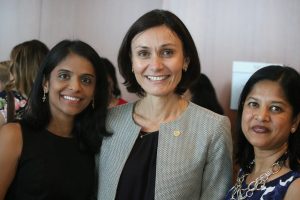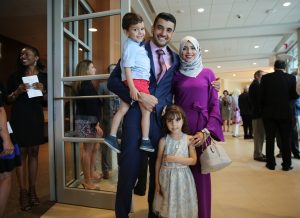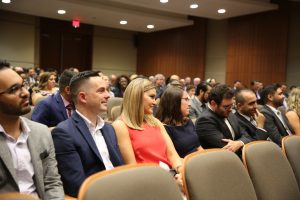 As doctors, they came to UCF from across the world – including Puerto Rico, the Philippines, Iraq, the United Kingdom and the U.S. And on June 7, they graduated as the College of Medicine’s first residents –trained for the last three years through a partnership that gave them the opportunity to care for veterans and residents of Central Florida fastest-growing, most diverse community.
As doctors, they came to UCF from across the world – including Puerto Rico, the Philippines, Iraq, the United Kingdom and the U.S. And on June 7, they graduated as the College of Medicine’s first residents –trained for the last three years through a partnership that gave them the opportunity to care for veterans and residents of Central Florida fastest-growing, most diverse community.
The internal medicine residency program created by UCF and the Osceola Regional and Orlando VA medical centers in 2014 led to a consortium between the medical school and Hospital Corporation of America’s North Florida Division. In the last two years, that partnership has created 15 additional graduate medical education programs, with more on the way. HCA and UCF are now also partnering to build a community-based teaching hospital in Lake Nona.
Many graduation ceremony speakers thanked the residents for taking a chance on a new program and helping to build it into a better one. Residents and their faculty physicians were applauded for their commitment, flexibility and perseverance in creating a program that included training at two sites with very diverse patients.
“Residency is hard no matter where you go,” said Dr. Abdo Asmar, program director of the internal medicine residency and UCF’s vice chair of internal medicine. “You had typical residency challenges plus the challenges of creating a new program from scratch. I know those challenges make you a very different doctor than all of the other residents who will graduate this year. You are pioneers.”
Of the 16 graduating internal medicine residents, nine are staying in Central Florida. Two will practice in Gainesville. Three are going onto fellowships in specialties such as hematology/oncology and sleep medicine. Three are going out of state to practice. The medical school also graduated its first OB-GYN physician at the event, whose training program at Osceola Regional joined the consortium in the past two years.
 Dr. Nnenna Maduforo, shown at center right, will practice in Washington, D.C., where she ultimately hopes to create women’s education centers that provide healthcare and training to inner-city communities. She says she’s wanted to be an OB-GYN since she was a girl because the specialty allows her to care for women from their teenage years through pregnancy and to the end of life. “Women are such a dynamic group,” she said. “They are pioneers. A woman keeps the family going.”
Dr. Nnenna Maduforo, shown at center right, will practice in Washington, D.C., where she ultimately hopes to create women’s education centers that provide healthcare and training to inner-city communities. She says she’s wanted to be an OB-GYN since she was a girl because the specialty allows her to care for women from their teenage years through pregnancy and to the end of life. “Women are such a dynamic group,” she said. “They are pioneers. A woman keeps the family going.”
Dr. Maduforo credited her residency training with giving her the opportunity to serve a diverse set of patients. She delivered babies and did surgery at Osceola Regional. She cared for women at the Osceola Health Department, female veterans at the Orlando VA Medical Center, and at-risk mothers at Florida Hospital. As she spoke after the graduation ceremony, 15-month-old Sebastian Dick, sporting a bowtie just like his graduating resident father, ran by. “We delivered him,” she said in delight.

Sebastian’s dad, Dr. Rizcallah Dick, at left, will now become the internal medicine chief resident at Osceola Regional. “It’s a very exciting time for our program,” he said of the residency that now has grown to three full classes. He said he chose to remain at Osceola and become chief resident “because I was so honored to be selected three years ago and I want to pay back the program and help it grow.”
Residency programs have a direct impact on a community’s number of doctors and residents’ access to healthcare. That’s because in order to practice, medical school graduates must complete residency training in a specific specialty for three to seven years. Florida’s number of residency programs has not kept pace with its population growth, creating a physician shortage in many areas.
Increasing numbers of residency programs can help ease this shortage because most residents set up practices where they train.
“Residency programs are part of the promise we made to this community,” said Dr. Deborah German, UCF vice president for medical affairs and founding dean of the College of Medicine. “If we have more residencies, we’ll have more trained doctors in our community. We’ll become a net importer of medical talent.”
As he spoke for residents at the ceremony, Dr. Faraz Afridi talked about the physician faculty who had taught the young doctors, and the patients who had trusted them with their care. “We will finally take our solo flight,” he said of finishing residency. “We learned to honor our Osceola and VA communities.”
Faculty and Residency Award Winners
Osler Award for Excellence in in-patient general medicine teaching — Dr. Sayed Ali
Osler Award for Excellent in outpatient general medicine teaching — Dr. David Simmons
Osler Award for Excellence in subspecialty teaching — Drs. Lazaro Delgado and Allison Carilli
Resident Humanitarian Award
• PGY 1: Dr. Zhabiz Solhjou
• PGY 2: Dr. Nway Koko
• PGY 3: Dr. Mustafa Kinaan
Resident Clinical Skills Award
• PGY 1: Dr. Luis Sanchez
• PGY 2: Dr. Natalia Castillo-Alemeida
• PGY 3: Dr. James Mellone
Resident Best Teacher Award from Medical Students
• PGY 1: Dr. Abed Madenieh
• PGY 2: Dr. Stephen Dodson
• PGY 3: Dr. Rizcallah Dick





